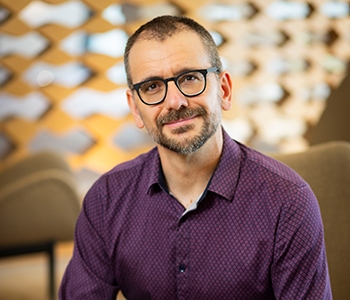
Developing new therapeutic approaches for combating advanced breast cancer
Published: 04/30/24 8:28 AM

Thierry Jardé
Project Description:
Metastasis, the spread of cancer to other parts of the body, is responsible for all breast cancer related deaths. Breast cancers as well as metastatic deposits are surrounded by cells called cancer-associated fibroblasts (CAFs) that are understood to support tumour growth and invasion, create resistance to treatment, and cause relapse. In this NBCF-funded research, Dr Thierry Jardé and colleagues will use patient derived models of breast cancer to investigate the proteins secreted by CAFs that play a role in communicating signals, which promote the growth and survival of cancer cells. The goal will be to block these cellular communications between CAFs and cancer cells, offering an innovative and effective treatment approach for advanced breast cancer.
Why is this work needed:
Despite significant advances in breast cancer research leading to enhanced treatments and outcomes in recent decades, over 3,200 Australians still succumb to breast cancer annually. Metastatic disease, characterised by the spread of cancer to other parts of the body, is responsible for all breast cancer related deaths. Hence, acquiring new insights into the factors driving tumour growth and metastasis is crucial for developing more effective treatment options and reducing deaths from breast cancer.
Expected outcomes:
The successful outcomes of this study will reveal key proteins secreted by CAFs involved in promoting the growth and spread of breast cancer. This lays the foundation for the development of novel more effective therapeutic strategies for advanced breast cancer.
Project description:
Breast cancer ranks as the second most frequently detected cancer in Australia, with over 20,000 new diagnoses per year. While cancers detected at an early stage, and confined within the breast, have a high survival rate, about 16% of patients are diagnosed with advanced disease. Moreover, between 20-30% of patients initially diagnosed with early-stage breast cancer also progress to metastatic disease, characterised by the spread of cancer to other parts of the body and poor survival outcome. Metastatic disease is responsible for all breast cancer related deaths.
Breast cancers as well as metastatic deposits are surrounded by cells called cancer-associated fibroblasts (CAFs) that support tumour growth and invasion, create resistance to treatment, and can cause relapse. Therefore, tumours highly enriched with CAFs are associated with higher mortality rates.
In this NBCF-funded study, Dr Thierry Jardé from Monash University and colleagues aim to understand how CAFs communicate with tumour cells to drive their growth and survival. With the use of patient derived breast cancer cells and CAFs, the team will generate 3-dimensional laboratory versions of breast tumours that mimic the cellular makeup of the original tumours. The goal is to reveal CAFs-produced factors that promote tumour growth to generate therapeutic targets that disrupt the communication between CAFs and cancer cells. Outcomes from this study seek to reveal novel treatment strategies for advanced breast cancer and improve survival outcomes.
